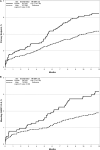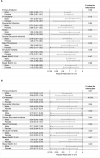Sex-Specific Differences in Clinical Outcomes After Percutaneous Coronary Intervention: Insights from the TAILOR-PCI Trial
- PMID: 35699175
- PMCID: PMC9238632
- DOI: 10.1161/JAHA.121.024709
Sex-Specific Differences in Clinical Outcomes After Percutaneous Coronary Intervention: Insights from the TAILOR-PCI Trial
Abstract
Background TAILOR-PCI (Tailored Antiplatelet Initiation to Lessen Outcomes due to decreased Clopidogrel Response After Percutaneous Coronary Intervention) studied genotype-guided selection of antiplatelet therapy after percutaneous coronary intervention versus conventional therapy with clopidogrel. The presence of CYP2C19 loss-of-function alleles in patients treated with clopidogrel may be associated with increased risk for ischemic events. We report a prespecified sex-specific analysis of genotyping and associated cardiovascular outcomes from this study. Methods and Results Associations between sex and major adverse cardiac events (MACE: cardiovascular death, myocardial infarction, stroke, stent thrombosis, and severe recurrent ischemia) and Bleeding Academic Research Consortium (BARC) bleeding at 12 months were analyzed using Cox proportional-hazards models. Among 5276 randomized patients, loss-of-function carriers were observed in ≈36% of both sexes, and >80% of carriers were heterozygotes. At 12 months, after adjustment for baseline differences, risks of MACE (HR , 1.28 [0.97 to 1.68]; P=0.088) and BARC bleeding (hazard ratio [HR], 1.36 [0.91 to 2.05]; P=0.14) were comparable among women and men. There were no significant interactions between sex and treatment strategy for MACE interaction P value (Pint=0.59) or BARC bleeding (Pint=0.47) nor for sex and genotype (MACE Pint=0.15, and BARC bleeding Pint=0.60). Conclusions CYP2C19 loss-of-function alleles were present in ≈1 in 3 women and men. Women had similar adjusted risks of MACE and bleeding as men following percutaneous coronary intervention. Genotype-guided therapy did not significantly reduce the risk of MACE or bleeding relative to conventional therapy for both sexes. Registration URL: https://www.clinicaltrials.gov; Unique identifier: NCT01742117.
Keywords: TAILOR‐PCI; genotype; sex differences.
Figures





Similar articles
-
Effect of Genotype-Guided Oral P2Y12 Inhibitor Selection vs Conventional Clopidogrel Therapy on Ischemic Outcomes After Percutaneous Coronary Intervention: The TAILOR-PCI Randomized Clinical Trial.JAMA. 2020 Aug 25;324(8):761-771. doi: 10.1001/jama.2020.12443. JAMA. 2020. PMID: 32840598 Free PMC article. Clinical Trial.
-
The contribution of genotype-guided selection of P2Y12 inhibitor on prognosis in ACS /CCS patients undergoing percutaneous coronary intervention: a retrospective cohort study.Eur J Clin Pharmacol. 2023 Sep;79(9):1249-1259. doi: 10.1007/s00228-023-03519-y. Epub 2023 Jul 14. Eur J Clin Pharmacol. 2023. PMID: 37449992
-
Effect of CYP2C19 genotype on outcomes of treatment with ticagrelor versus clopidogrel in acute coronary syndrome patients with diabetes mellitus: A analysis in a large-scale, real-world study.Eur J Pharmacol. 2025 Jun 5;996:177546. doi: 10.1016/j.ejphar.2025.177546. Epub 2025 Mar 25. Eur J Pharmacol. 2025. PMID: 40147574
-
Impact of CYP2C19 Genotype Status on Clinical Outcomes in Patients with Symptomatic Coronary Artery Disease, Stroke, and Peripheral Arterial Disease: A Systematic Review and Meta-Analysis.Drugs. 2024 Oct;84(10):1275-1297. doi: 10.1007/s40265-024-02076-7. Epub 2024 Sep 5. Drugs. 2024. PMID: 39235670 Free PMC article.
-
Effects of the CYP2C19 LoF allele on major adverse cardiovascular events associated with clopidogrel in acute coronary syndrome patients undergoing percutaneous coronary intervention: a meta-analysis.Pharmacogenomics. 2022 Feb;23(3):207-220. doi: 10.2217/pgs-2021-0098. Epub 2022 Jan 19. Pharmacogenomics. 2022. PMID: 35042400
Cited by
-
Percutaneous Coronary Intervention: Sex Differences May Not Matter After All.JACC Asia. 2025 Apr;5(4):552-553. doi: 10.1016/j.jacasi.2024.11.016. JACC Asia. 2025. PMID: 40180546 Free PMC article.
-
Impact of the Japanese Version of High Bleeding Risk Criteria on Clinical Outcomes in Patients with ST-segment Elevation Myocardial Infarction.J Atheroscler Thromb. 2024 Jun 1;31(6):917-930. doi: 10.5551/jat.64445. Epub 2023 Dec 14. J Atheroscler Thromb. 2024. PMID: 38092385 Free PMC article.
-
Patient-Related Factors Predicting Stent Thrombosis in Percutaneous Coronary Interventions.J Clin Med. 2023 Nov 28;12(23):7367. doi: 10.3390/jcm12237367. J Clin Med. 2023. PMID: 38068419 Free PMC article. Review.
-
Sex Differences in Outcomes After Contemporary Percutaneous Coronary Intervention: Insights From the PENDULUM Registry.JACC Asia. 2025 Apr;5(4):543-551. doi: 10.1016/j.jacasi.2024.09.017. JACC Asia. 2025. PMID: 40180545 Free PMC article.
-
Time Trends in Major Adverse Cardiovascular Events After Percutaneous Coronary Intervention: Meta-Analysis on Sex Differences.JACC Adv. 2025 Jan 8;4(2):101526. doi: 10.1016/j.jacadv.2024.101526. eCollection 2025 Feb. JACC Adv. 2025. PMID: 39886313 Free PMC article.
References
-
- Mehta LS, Beckie TM, Devon HA, Grines CL, Krumholz HM, Johnson MN, Lindley KJ, Vaccarino V, Wang TY, Watson KE, et al. American Heart Association Cardiovascular Disease In W, Special Populations Committee Of The Council On Clinical Cardiology Coe, Prevention Coc, Stroke N, Council On Quality Of C And Outcomes R . Acute myocardial infarction in women: a scientific statement from the American Heart Association. Circulation. 2016;133:916–947. doi: 10.1161/CIR.0000000000000351 - DOI - PubMed
-
- Khera S, Kolte D, Gupta T, Subramanian KS, Khanna N, Aronow A, Ahn C, Timmermans RJ, Cooper HA, Fonarow GC, et al. Temporal trends and sex differences in revascularization and outcomes of ST‐segment elevation myocardial infarction in younger adults in the United States. J Am Coll Cardiol. 2015;66:1961–1972. - PubMed
-
- Sarma S, Braunwald E, Cannon CP, Guo J, Im K, Antman EM, Gibson CM, Newby LK, Giugliano RP Morrow DA, et al. Outcomes of women compared with men after non‐ST‐segment elevation acute coronary syndromes. J Am Coll Cardiol. 2019;74:3013–3022. - PubMed
Publication types
MeSH terms
Substances
Associated data
Grants and funding
LinkOut - more resources
Full Text Sources
Medical
Miscellaneous

